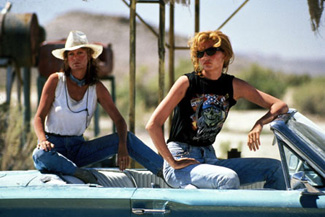|
|
Viking Night: Thelma & LouiseBy Bruce HallJanuary 10, 2012
It's utterly preposterous. But if you step back and look objectively, Thelma & Louise is a largely symbolic story. It rains a lot in this world, but either intentionally or because they filmed in a place where the sky sputters fifteen inches a year, they hauled in water machines. The net effect renders every storm a sunshower, implying that proverbial silver lining your mother always told you about. As the women hustle from Arkansas toward Mexico in their convertible, they make the puzzling decision to avoid passing through Texas. Ostensibly, this is because Louise's dark past lurks there. But it also allows them to pass through New Mexico and Arizona, and the sweeping desert vistas there lend the movie the majestic, open feel of a John Ford western. Rather than film at dawn or dusk, Ridley Scott plants giant spotlights in the desert to unnaturally accentuate the rock formations at night, and the light effects most films use to film car interiors at night are highly exaggerated here. As the two fugitives resort to robbery and violence to sustain themselves, they stop being women and become giants, from the way they act to the way the scenes are filmed. Everything about Thelma & Louise is larger than life hyperbole, like the tall tales your grandfather once told you. This isn't a movie, it's a fable. It's a ballad. It's doesn't quite venture into Raising Arizona territory, but there's no way you should mistake this movie for anything but allegory. Thelma and Louise are living representations of the need to take your life into your own hands and stop letting events around you dictate who you are and what your fate will be. The implication is that if we fail to meet the future head on, it will come looking for you, and you might not like what it brings with it. Louise allowed a tragedy in her past to prevent her from taking her relationship with Jimmy where they both wanted it to go. Thelma let her fear of failure make her weak and submissive. And when the future came looking for them, it wasn't what they wanted or expected. But in the movie's famous, final climactic scene, for the first time in their lives, both women are truly masters of their domain.
|

|
|
|

|
Friday, November 1, 2024
© 2024 Box Office Prophets, a division of One Of Us, Inc.


